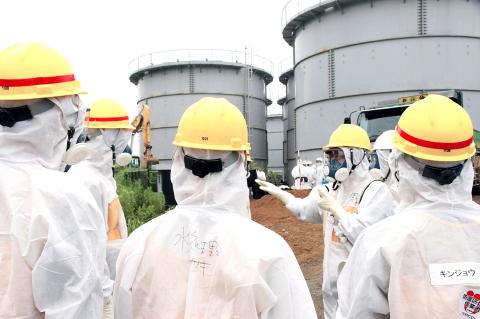Nuclear watchdog inspectors who toured Japan’s crippled Fukushima Dai-ichi nuclear power plant following the discovery of a huge radioactive leak declared yesterday that water storage at the site was “sloppy.”
Earlier this week about 300 tonnes of radioactive liquid is believed to have escaped from one of the hundreds of tanks holding liquid used to cool the broken reactors, in an episode dubbed the most serious in nearly two years.
“I can’t help but say it was sloppy,” said Nuclear Regulation Authority committee member Toyoshi Fuketa of Tokyo Electric Power Co’s (TEPCO) management of contaminated water, according to Jiji Press.

Photo: AFP
Fuketa was part of a 15-member team, including experts on radiation and water flow, who visited the wrecked power station to see for themselves how the polluted water had escaped.
The one-day inspection finished late yesterday, an agency official said.
“We will analyze results of the inspection and discuss them at a working group next week,” the official said. “We may carry out further on-site inspections if necessary.”
TEPCO said the leak may have carried radioactive materials out to sea.
Groundwater that has mixed with polluted water has already seeped into the ocean, with the company launching an operation to pump it out of 28 wells, it said yesterday.
On Thursday workers looking for other holed tanks found two areas near other containers where radiation was unexpectedly high, although they could see no leaks.
A catalogue of mishaps, often accompanied by a perceived unwillingness to publicly reveal the extent of problems, is leading to a growing chorus warning of the need for outside experts to step in and take control of the cleanup operation.

A Ministry of Foreign Affairs official yesterday said that a delegation that visited China for an APEC meeting did not receive any kind of treatment that downgraded Taiwan’s sovereignty. Department of International Organizations Director-General Jonathan Sun (孫儉元) said that he and a group of ministry officials visited Shenzhen, China, to attend the APEC Informal Senior Officials’ Meeting last month. The trip went “smoothly and safely” for all Taiwanese delegates, as the Chinese side arranged the trip in accordance with long-standing practices, Sun said at the ministry’s weekly briefing. The Taiwanese group did not encounter any political suppression, he said. Sun made the remarks when

The Taiwanese passport ranked 33rd in a global listing of passports by convenience this month, rising three places from last month’s ranking, but matching its position in January last year. The Henley Passport Index, an international ranking of passports by the number of designations its holder can travel to without a visa, showed that the Taiwan passport enables holders to travel to 139 countries and territories without a visa. Singapore’s passport was ranked the most powerful with visa-free access to 192 destinations out of 227, according to the index published on Tuesday by UK-based migration investment consultancy firm Henley and Partners. Japan’s and

BROAD AGREEMENT: The two are nearing a trade deal to reduce Taiwan’s tariff to 15% and a commitment for TSMC to build five more fabs, a ‘New York Times’ report said Taiwan and the US have reached a broad consensus on a trade deal, the Executive Yuan’s Office of Trade Negotiations said yesterday, after a report said that Washington is set to reduce Taiwan’s tariff rate to 15 percent. The New York Times on Monday reported that the two nations are nearing a trade deal to reduce Taiwan’s tariff rate to 15 percent and commit Taiwan Semiconductor Manufacturing Co (TSMC, 台積電) to building at least five more facilities in the US. “The agreement, which has been under negotiation for months, is being legally scrubbed and could be announced this month,” the paper said,

Japan and the Philippines yesterday signed a defense pact that would allow the tax-free provision of ammunition, fuel, food and other necessities when their forces stage joint training to boost deterrence against China’s growing aggression in the region and to bolster their preparation for natural disasters. Japan has faced increasing political, trade and security tensions with China, which was angered by Japanese Prime Minister Sanae Takaichi’s remark that a Chinese attack on Taiwan would be a survival-threatening situation for Japan, triggering a military response. Japan and the Philippines have also had separate territorial conflicts with Beijing in the East and South China